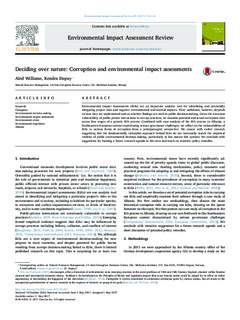Deciding over nature: Corruption and environmental impact assessments
Journal article, Peer reviewed
Permanent lenke
http://hdl.handle.net/11250/2493940Utgivelsesdato
2017-07-01Metadata
Vis full innførselSamlinger
- Publications [1488]
Originalversjon
in Environmental Impact Assessment Review vol. 65 pp. 118-124 10.1016/j.eiar.2017.05.00210.1016/j.eiar.2017.05.002
Sammendrag
Environmental Impact Assessments (EIAs) are an important analytic tool for identifying and potentially mitigating project risks and negative environmental and societal impacts. Their usefulness, however, depends on how they are implemented and on whether findings are used in public decision-making. Given the notorious vulnerability of public-private interactions to corrupt practices, we examine potential and actual corruption risks across four stages of a generic EIA process. Combined with case analysis of the EIA process in Albania, a Southeastern European context experiencing serious governance challenges, we reflect on the vulnerabilities of EIAs to various forms of corruption from a principal-agent perspective. We concur with earlier research suggesting that the fundamentally rationalist approach behind EIAs does not necessarily match the empirical realities of public environmental decision-making, particularly in less mature EIA systems. We conclude with suggestions for framing a future research agenda in this area and touch on tentative policy remedies.
Serie
Environmental Impact Assessment Review vol. 65Environmental Impact Assessment Review vol. 65
